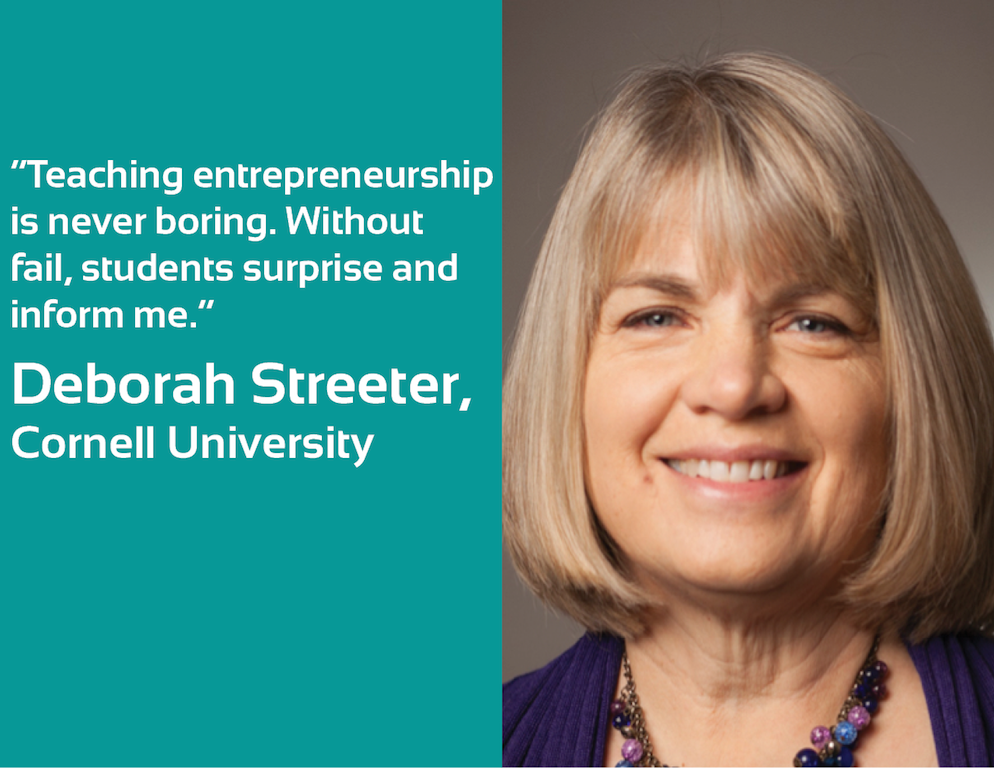
This week we continue our series highlighting educators within the VentureWell network that are doing good work—faculty members that are challenging norms in higher education and inspiring students to impact the world through invention.
This month’s faculty spotlight is Deborah Streeter, the Bruce F. Failing Senior Professor of Personal Enterprise and Small Business Management at Cornell University. Streeter is also an instructor for the I-Corps upstate New York node.
How did you get interested in teaching entrepreneurship?
I entered the entrepreneurship arena in early 90s when, through a fluke of circumstances, the endowed chair I now hold became vacant. My department Chair encouraged me to throw my hat in the ring. It was a challenge to completely shift my teaching and research on a brand new area, but entrepreneurship education has been a perfect fit for me. I love thinking about innovation, especially tech innovation. I have come to deeply appreciate entrepreneurship students. They are very optimistic, curious, inventive, tolerant of ambiguity, and appreciative of experiential learning. Also, I quickly found that students responded well to innovations and interactivity I like to use in the classroom.
What is your favorite thing about teaching?
It’s magical when a teacher and a student start communicating in a way that empowers and informs each of them. Teaching entrepreneurship is never boring. Without fail, students surprise and inform me. I like finding the ways to “illuminate the pathway” — a term I stole from Starr Marcello. I always say to my students, “I don’t know the answers to many of your questions. What I do know is how to help you use evidence-based tools and frameworks that will help you grope around in the darkness to find a way forward.”
Where would you like to see the field of entrepreneurship in five years?
I hope we’ll be able to strengthen the connection between research and teaching. We must have research-based legitimacy to make gains as a field. We also need the real-world insights and experiences that come from more clinical professors. We have to learn from one another and work together to gain visibility and legitimacy, and to attract resources from the university.
What traits make for great teachers, advisors, and mentors?
A great teacher must have a natural curiosity about people and possess some level of emotional intelligence. They embrace the more difficult tasks of listening, responding with empathy, and being open to what that person needs in the moment to accelerate learning. That may be encouragement, tough love, data, or perspective.
What books on entrepreneurship and innovation have you been reading lately?
You might not think of it as an entrepreneurship book, but I have been reading Double Bind: Women on Ambition, a collection of essays edited by Robin Romm. Women are underrepresented in almost every dimension of entrepreneurship education. Why? I have to believe that some part of the answer stems from the complicated relationship that women have with ambition. In the world where unconscious bias has created the so-called “double bind” — where female leaders have to be nice, but not too nice and have strong voices but not be “too loud” — being “all in” enough to start and run a company may be in conflict with internal and external expectations of some women. I also listen to many podcasts, but my favorite is Startup. The topics range from managing burnout to Lean Startup.
What’s your most useful classroom activity or assignment?
I think almost all entrepreneurship professors use techniques to create what is now considered to be a “flipped classroom.” I’m no different. Students in my courses work to develop business ideas and concepts, go out to understand customers, pivot, pitch, and spend time outside the building to learn and practice Lean Startup concepts. I also try to spark interesting conversations inside my classroom. Sometimes I do that by using short, focused video clips or the Startup podcast. I use the mishaps and adventures featured in the podcast to illuminate important ideas and concepts. The episodes are a perfect match with so many concepts related to entrepreneurship and Lean Startup. The class becomes very invested and opinionated about the founders and the company.